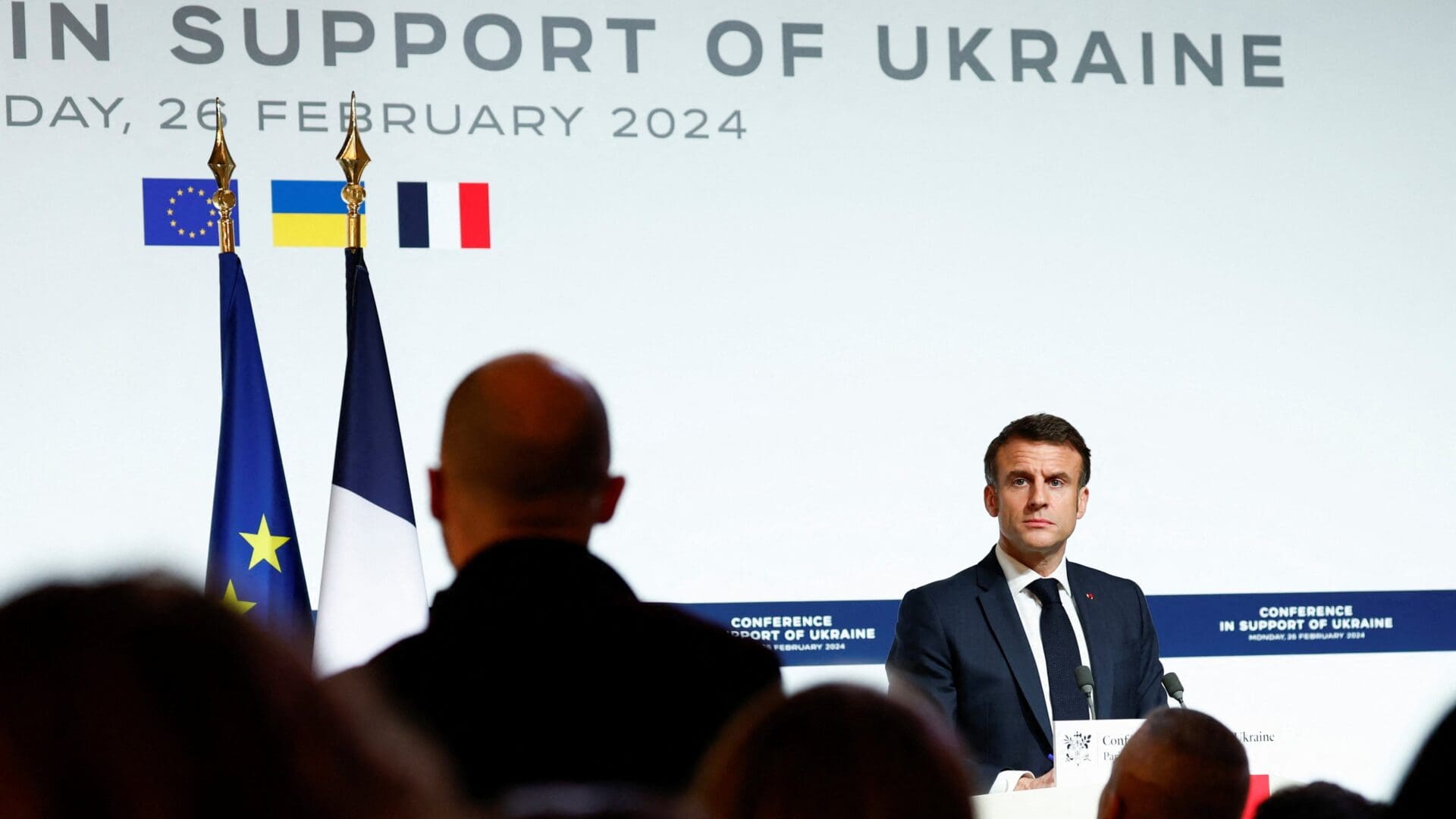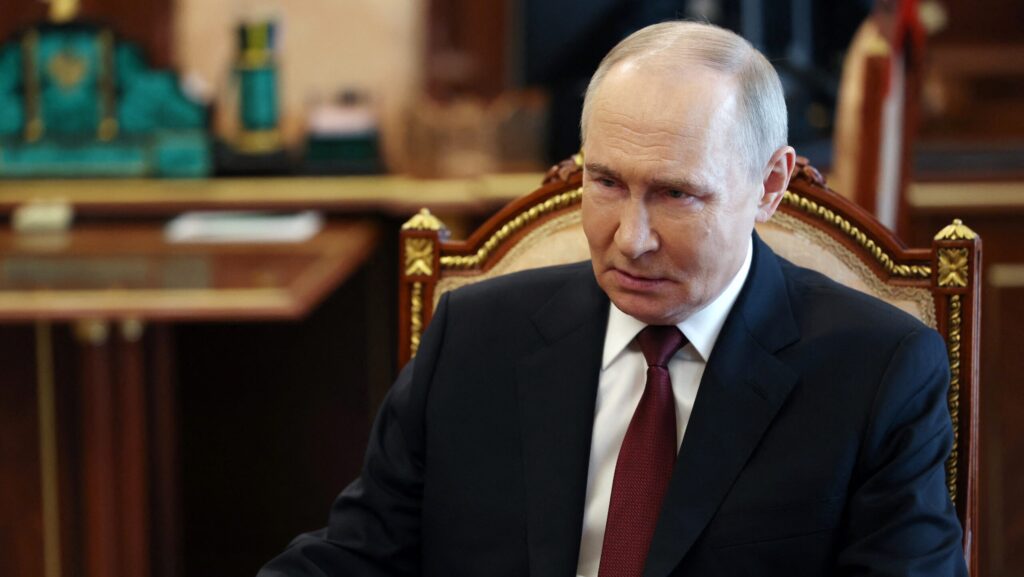‘Nothing should be ruled out…We will do everything to prevent Russia from winning this war,’ Emmanuel Macron said on Monday at a conference in Paris on supporting Ukraine. The French President also informed journalists that the allies had openly discussed the possibility of deploying troops to Ukraine. ‘We should not exclude that there might be a need for security that then justifies some elements of deployment.’
Macron’s words have sparked a huge outcry, with allies distancing themselves from the French head of state’s statements. US President Joe Biden was one of the first to react, stating that the US position was to provide Ukraine with the level of support that the Ukrainian army could utilize to stop and defeat the Russian army. He underlined that the United States would not send troops to Ukraine.
German Chancellor Olaf Scholz reaffirmed the position that no EU or NATO member state would send troops to the war-torn country. British Prime Minister Rishi Sunak said that apart from the British units currently training Ukrainian soldiers London was not planning on deploying a larger contingent.
The position of the aforementioned leaders was supported by Italy, Spain, the Czech Republic, Poland, and NATO Secretary General Jens Stoltenberg, among others.
During a press conference held after the Visegrád Group summit on Tuesday, Viktor Orbán reiterated Hungary’s stance regarding the ongoing war, stating: ‘Hungary remains firm in its decision not to dispatch weapons to Ukraine, either with or without soldiers.’
Following the statement, Kremlin spokesman Dmitry Peskov swiftly responded, asserting that the deployment of NATO troops in Ukraine would inevitably escalate tensions into a direct confrontation between Moscow and all member states of the defence alliance. Subsequently, Russian President Vladimir Putin addressed this concern during his State of the Nation address to both houses of the Russian legislature on Thursday. Putin warned against what he termed as the West’s perilous foreign policy manoeuvres and rhetoric, highlighting the imminent threat of conflict escalating to the
potential use of nuclear weaponry and the catastrophic destruction of civilization.
Ukrainian President Volodymyr Zelenskyy expressed his appreciation for Macron’s statement, emphasizing the significance of any global initiative that bolsters Ukraine’s position. ‘If the international community’s actions serve to strengthen Ukraine, it is beneficial for the entire world,’ President Zelenskyy remarked. Echoing similar sentiments, Estonian Prime Minister Kaja Kallas also voiced support for Macron’s idea. Additionally, the European Parliament recently passed a resolution believed to be influenced by the French President’s remarks. The resolution, supported by the left-wing majority of the EP, underscored the imperative for member states to provide Ukraine with all necessary support to secure victory and reclaim control over its internationally recognized territory.
Macron’s U-turn
Macron’s recent statement is all the more puzzling considering his earlier stance on the Russo–Ukrainian war. The French President stood out as one of the few voices advocating for diplomatic dialogue with Russia, a position relatively distinct from that of other Western leaders. Macron consistently emphasized the necessity of maintaining communication channels with Moscow. Notably, before the outbreak of the full-scale war, he even engaged in direct consultations with the Russian President during a visit to Moscow. Furthermore, following the Russian invasion, Macron continued this dialogue by engaging in telephone discussions with Putin.
The timing of the French President’s statement appears to have been a strategic move, possibly serving as a campaign kick-off ahead of the upcoming European Parliament elections
in the summer. France’s support for Ukraine has been notably modest relative to its size and economic stature. According to the Kiel Institute for the World Economy Ukraine Support Tracker, France ranks 15th in terms of military, financial, and humanitarian aid provided to Ukraine. The proposition of sending Western troops to Ukraine could be construed as an attempt to divert attention from the comparatively limited contributions made by France. It’s worth noting that Berlin has previously voiced criticism toward Paris for its perceived lack of commitment in this regard.
As the European Parliament elections approach, Macron’s party, La République En Marche (LREM), finds itself in third place in France’s political landscape. Over the past year, LREM, a centrist-liberal party, has experienced decreasing support, which dropped by approximately four percentage points to the current standing of 19 per cent. Leading the polls is Marine Le Pen’s National Rally, which holds a sceptical stance regarding support for Ukraine and sanctions against Russia, garnering 28 per cent of the vote. Following closely behind is the far-left New Ecological and Social People’s Union, led by Jean-Luc Mélenchon, with 24 per cent. Notably, Macron continues to grapple with a high disapproval rating, which has remained elevated since April of last year, currently standing at 68 per cent.
While fortunes of the French President are not looking good at home, the same can be said on the European stage, where the Renew EP political group has recently witnessed a decline in its popularity. This decline can be attributed mainly to the rise of right-wing groups such as Identity and Democracy (ID) and the European Conservatives and Reformists (ECR).
A Cautionary Tale for the French President
Advocating for the deployment of Western troops in Ukraine is likely not the most effective campaign strategy Macron could have pursued. A poll conducted last December revealed that only 20 per cent of French people support increasing military and strategic aid to Kyiv. 39 per cent believe that aid should be reduced or halted entirely, while 26 per cent support maintaining the current levels of assistance. Therefore, Macron’s statement is
primarily appealing to the most radical pro-war voters,
who constitute a significant minority in both France and Europe as a whole.
It is evident that irresponsible, warmongering statements have the potential to lose elections rather than win them. To illustrate this point, the French President need only examine and analyse the outcome of the 2022 Hungarian parliamentary elections and the failed strategy of Péter Márki-Zay, the candidate of the ‘Unity for Hungary’ all-opposition coalition. Prior to the outbreak of war, the Márki-Zay gave an interview to Partizán, stating that he would even deploy Hungarian soldiers to Ukraine if the situation escalated into open conflict. However, on 22 February 2022, just two days before Russia’s full-scale invasion, Márki-Zay modified his stance, mentioning a willingness to provide ‘only’ weapons: ‘If NATO decides to support Ukraine with weapons, we will, of course, support it.’
His opinion was echoed by the then leader of the left-wing Momentum, András Fekete-Győr, who stated: ‘First and foremost, like our allies, we should offer weapons and humanitarian aid to the Ukrainian government to contribute to the protection of the Hungarian minority in Transcarpathia.’
In contrast, the governing parties have consistently opposed sending both arms and soldiers to Ukraine, citing concerns about the safety of the Hungarian community in Transcarpathia. Arms shipments passing through Hungary would inevitably pass through Transcarpathia and become immediate targets for Russian missiles, thereby putting the Hungarians living in the region in considerable danger.
The outcome of the elections is already well-known to everyone. Fidesz–KDNP has secured a historic victory, clinching two-thirds of the seats for the fourth time. In contrast, the opposition coalition suffered a humiliating defeat, with fault lines emerging during the campaign, partly attributed to Péter Márki-Zay’s radical pro-war stance. Despite his attempts to clarify his statements, Hungarian voters remembered his earlier commitment to sending troops to Ukraine if he was elected prime minister.
Following the electoral defeat, Márki-Zay stood alone on the stage, with no one from the six-party coalition sharing his failure. With his recent statement, Macron has found himself isolated on the European political stage.
If he persists with his dangerous pro-war rhetoric, it could result in significant losses for the European left in the European Parliament elections.
Related articles:








